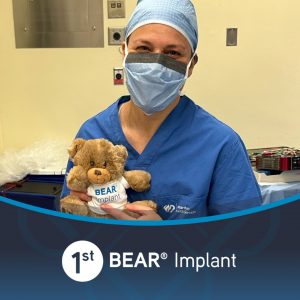![]()
Implant First Innovation in ACL Tear Treatment in 30+ Years; Enables Injured ACL to Heal Itself

CORVALLIS, OR– Dr. Angela Passanise with The Corvallis Clinic is the first in the Mid-Willamette Valley to offer the BEAR® Implant for the treatment of anterior cruciate ligament (ACL) tears, one of the most common knee injuries in the U.S. The BEAR Implant is the first medical advancement to enable the body to heal its own torn ACL. This new approach is a paradigm shift from the current standard of care – reconstruction that replaces the ACL with a graft – and is the first innovation in ACL tear treatment in more than 30 years.
Every year, approximately 400,000 ACL injuries occur in the U.S. A torn ACL does not heal without treatment, resulting in ACL reconstruction being one of the most common orthopedic procedures in the U.S. Yet the procedure has drawbacks; some procedures require two separate incisions, and some people who undergo reconstruction are unable to return to the same level of daily activities or sports.
“ACL tears are predominately difficult recovery, and it just affords patients an opportunity not to deal with some of the morbidities that come with ACL reconstruction surgery, and they don’t have to compromise losing part of their quad or hamstring tendon or even the patella tendon to recreate their ACL and thus not compromise the strength of another muscle,” said Dr. Passanise. “It’s an exciting forefront in sports medicine, and I’m just happy to be a part of it.”
During an ACL reconstruction, the surgeon completely removes the remaining torn ACL and reconstructs it with either a tendon from the patient’s leg (called an autograft) or a deceased donor (called an allograft). As with any surgery, ACL reconstruction has certain risks. About half of the people who receive patellar tendon grafts experience pain while kneeling, and those who receive hamstring grafts have persistent weakness – as much as a 50% deficit two years after surgery.
Unlike reconstruction, the BEAR Implant does not require a second surgical wound site to remove a healthy tendon from another part of the leg or the use of a donor’s tendon. The BEAR Implant acts as a bridge to help the ends of the torn ACL heal together. The surgeon injects a small amount of the patient’s own blood into the implant and inserts it between the torn ends of the ACL in a minimally invasive procedure. The combination of the BEAR Implant and the patient’s blood enables the body to heal the torn ends of the ACL back together while maintaining the ACL’s original attachments to the femur and tibia. As the ACL heals, the body resorbs the BEAR Implant within approximately eight weeks.
The BEAR Implant was granted De Novo Approval from the U.S. Food and Drug Administration and is indicated for skeletally mature patients at least 14 years of age with a complete rupture of the ACL, as confirmed by MRI. Patients must have an ACL stump attached to the tibia to facilitate the restoration. The BEAR device must be implanted within 50 days of injury. Patients should discuss their individual symptoms, diagnosis, and treatment with their surgeon. The BEAR Implant has the same potential medical/surgical complications as other orthopedic surgical procedures, including ACL reconstruction. These include re-tear risk, infection, knee pain, meniscus injury, and limited range of motion.
The Corvallis Clinic, an independent, physician-led medical group, is a comprehensive multi-specialty organization serving Benton, Linn, and Lincoln counties. It offers more than 100 board-certified physicians and advanced clinical professionals in 27 specialties at 10 area locations. As the fourth-largest area employer, The Clinic has 600 employees.
